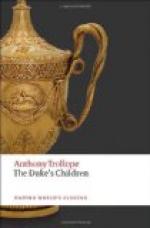But his word was before him! That prayer had to be made to his father, or rather some wonderful effort of eloquence must be made by which his father might be convinced that this girl was so infinitely superior to anything of feminine creation that had ever hitherto been seen or heard of, that all ideas as to birth, country, rank, or name ought in this instance to count for nothing. He did believe himself that he had found such a pearl, that no question of seeing need be taken into consideration. If the Duke would not see it the fault would be in the Duke’s eyes, or perhaps in his own words,—but certainly not in the pearl.
Then he compared her to poor Lady Mabel, and in doing so did arrive at something near the truth in his inward delineation of the two characters. Lady Mabel with all her grace, with all her beauty, with all her talent, was a creature of efforts, or, as it might be called, a manufactured article. She strove to be graceful, to be lovely, to be agreeable and clever. Isabel was all this and infinitely more without any struggle. When he was most fond of Mabel, most anxious to make her his wife, there had always been present to him a feeling that she was old. Though he knew her age to a day,—and knew her to be younger than himself, yet she was old. Something had gone of her native bloom, something had been scratched and chipped from the first fair surface, and this had been repaired by varnish and veneering. Though he had loved her he had never been altogether satisfied with her. But Isabel was as young as Hebe. He knew nothing of her actual years, but he did know that to have seemed younger, or to have seemed older,—to have seemed in any way different from what she was,—would have been to be less perfect.




